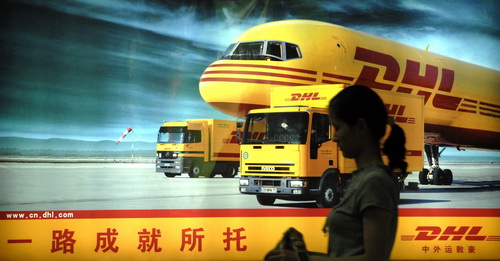-
News >Bizchina
DHL offers more shipping options
2010-07-02 10:00SHANGHAI - DHL, one of the world's leading logistics companies, announced the rollout of multi-modal services from China to overseas markets on Thursday, a step designed to further tap into the Chinese market.

A pedestrian walks in front of a DHL billboard in Guangzhou. DHL reported revenue totaling 33.7 billion euros ($41.38 billion) globally in 2009. [LU LU / FOR CHINA DAILY]
The new service combines air, road, rail and sea transportation to move cargo from China to the rest of the world, and is expected to reduce transport costs by between 20 and 50 percent.
The company said it will ease the capacity shortage for air and ocean freight from China, while providing more flexibility on transportation.
One motivation behind DHL's move is to take advantage of China's promising development of infrastructure, said Hermann Ude, chief executive officer of DHL Global Forwarding and Freight.
"China's ongoing investments in infrastructure development - road, rail, and world-class international flight connectivity - have opened up new possibilities for scheduled, reliable and flexible door-to-door services through the combined use of different transport modes," he said.
Dai Dingyi, vice-chairman of China Federation of Logistics & Purchasing, told China Daily the move demonstrates the foreign logistics' giant is expanding its presence in China's promising markets.
"Integration of services usually provides the possibility of further optimization. And the move would also help to reduce the cost of loading, unloading and storage, and improve profits," said Dai.
He added that a lack of transparency in the Chinese market might set barriers for foreign companies to develop efficient partnerships with players in China, especially State-owned giants that dominate transportation resources.
Chinese players have also been stepping up plans to integrate different shipping methods, making multi-transportation services already a mainstream developmental direction in China, said Zhang Hui, logistics analyst with Donghai Securities.
"That means DHL has to compete not only with foreign competitors like TNT in the Chinese market, but strong domestic players possessing overseas networks, such as COSCO Group," he said.
DHL has accelerated plans to explore the Chinese domestic service market in recent years.
At the end of 2008, DHL's joint venture with Sinotrans acquired one of the leading private express companies located in Shanghai to further develop its domestic network.
And the group announced in 2007 that it would spend $175 million to build its north Asian hub in Shanghai, with the new facility to be completed in the second half of this year.
In 2009, DHL reported revenue totaling 33.7 billion euros ($41.38 billion) globally, while its forwarding and freight division reported revenue totaling 10.9 billion euros.
DHL currently has 121 directly owned vehicles and 18 transportation centers for road freight in China.
